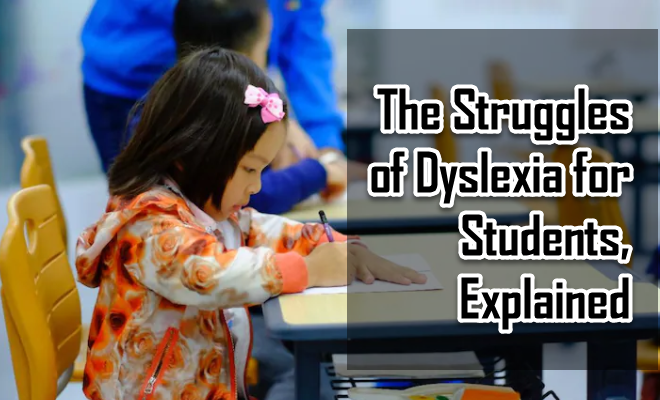Is your child struggling with dyslexia? It’s estimated that up to 15% of Americans have dyslexia, so your child isn’t alone. When they’re in school, though, they might feel isolated due to their condition.
The struggles of dyslexia can make a child feel unwilling to go to school. While school is often challenging for all children, for children with dyslexia, there are bigger challenges in store.
If you know that your child isn’t doing well in school, or if they’re suddenly less excited to go, we want to help. We’re here to break down some of the struggles that students with dyslexia face.
Keep reading so you can start understanding dyslexia as it applies to schoolchildren.

Struggles of Dyslexia In the Classroom
The primary concerns that your child will have at school are within the classroom (though they’re not exclusive to the classroom). Academic struggles and learning problems are common for people with dyslexia. With enough care, they’re manageable.
Here are a few academic problems that children with dyslexia can face at school.
Schoolwork In Class
Learning with dyslexia is complicated. It takes longer for children with dyslexia to read and process information, and that can make them fall behind.
Schools are often fast-paced. Teachers have a lot of information to convey in a short amount of time, and students with learning difficulties can fall between the cracks if they’re not careful.
Many teachers do their best to help children with dyslexia, but they don’t always have the proper resources if they’re not at a special school for those students. While they know that having books and assignments with larger text and a slower pace to their lessons can be helpful, if they don’t have the right tools for the job, they can’t offer as much help.
Many schools have aides for students who need extra help. There may be extra classes that your child can take, or the aide can stay with them in class. For some children, this is too embarrassing. Ensure that you let your child know that it’s normal to need extra help and that accepting it will make them a better student!
Asking for Help
Speaking of asking for help, many students with dyslexia struggle with this, at least at first.
Students who are quiet or shy may not be willing to speak out while class is in session. If a teacher moves too fast or the child can’t understand, they must be able to raise their hand and ask for help.
For some children, this is stressful. They may not want to feel like they’re being singled out, so they’ll refrain from getting the help they need.
Reading Out Loud
For many children with dyslexia, the idea of reading out loud in class is anxiety-inducing. Unfortunately, reading out loud is part of every child’s education. It’s a great way to improve both reading and speaking skills.
Make sure that your child is prepared for this. A teacher who is experienced with children with dyslexia can handle the situation with ease.
Work with your child at home to help them improve their reading skills. While they won’t be perfect, it will make it easier for your child to feel confident in class.
Social and Interpersonal Struggles
Many children struggle with interpersonal and emotional issues if they have dyslexia. This is problematic when they’re trying to develop their social intelligence and engage with other kids.
Here are a few things that you can look out for.
Embarrassment and Isolation
Students with dyslexia may want to isolate themselves if they’re not surrounded by other students with the same condition.
In childhood, everything is overwhelming. When something goes wrong in class, it’s normal for your child to be embarrassed and want to withdraw from their friends and classmates.
Even though this is tempting, you need to encourage your child to stay engaged with others. School is for academics, but it’s also to help children develop important social skills and make connections.
Bullying
Children who are in standard public schools may experience bullying if they have dyslexia that other students notice.
Navigating dyslexia is difficult at the best of times. It’s made harder when other students aren’t being kind. Children don’t yet have the emotional maturity to understand the importance of empathy, so even the nicest child could make fun of a struggling student.
If you’re worried that your child is experiencing bullying, talk to them and work together to figure out the best next steps.
Emotional Struggles
Children with dyslexia may have more difficulty regulating their emotions. While this isn’t an inherent symptom of dyslexia, it can result from embarrassment, isolation, and bullying.[adsense]
Children who don’t get adequate help for their learning condition may start to lash out or misbehave. They may experience signs of anxiety or depression. It’s important that you know how to identify these signs so you can help your child.
Does Your Child Struggle With Dyslexia?
If your child experiences some of these struggles of dyslexia in the classroom, it’s important that you support them. Remember that they’re as capable as any other student, but they may need extra help.
Every child deserves to feel safe and comfortable while they’re in school. Don’t let dyslexia stand in the way of your child’s education and development.
If you want your child to learn and grow in an environment that’s made just for children like them, we want to help. At Sage School for dyslexic children, we aim to provide children with all of the skills and resources that they’ll need to grasp the English language and thrive.



